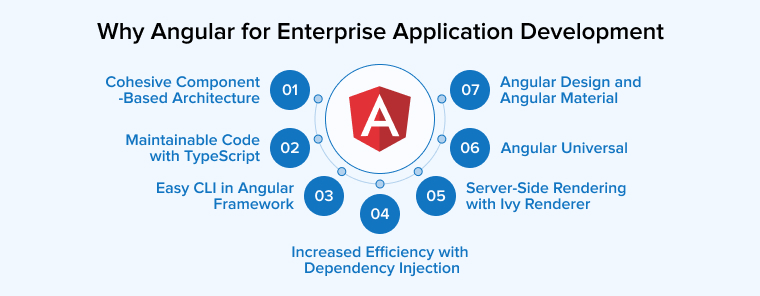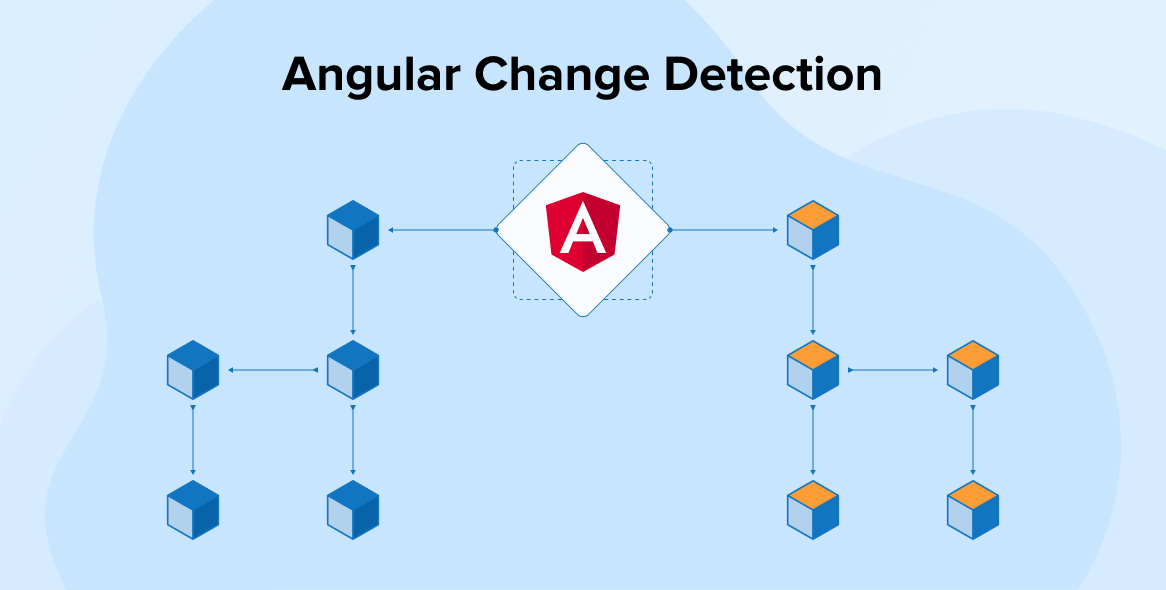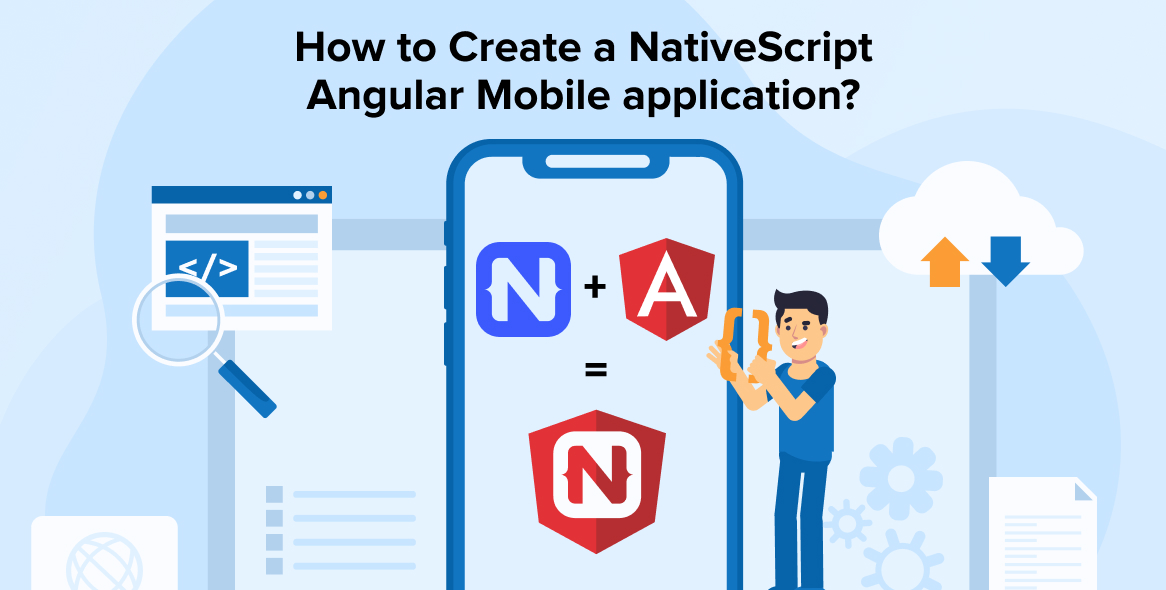
Angular is a technology developed by Google that is open-source, reactive, and content-rich. Numerous organizations leverage Angular to develop robust, scalable, and massive apps. Stephen Fluin, Google’s lead of Developer Relations, described how numerous Fortune 500 organizations have profited from using Angular enterprise apps followed by Angular best practices in a conversation.
For fact, Google utilizes dozens of Angular programs to manage inside procedures. Such enterprise-scale Angular applications significantly benefit both staff and clients.
You will learn about the top Angular framework characteristics that demonstrate why Angular is the finest technology for corporate app development in this post.
1. Why Angular is Best for Enterprise Application Development?

Some of the top reasons behind enterprise app development companies choosing Angular for web development are as follows:
1.1 Cohesive Component-Based Architecture
One of the main reasons why app development companies say that the future is enterprise-scale Angular apps is because of the component-based architecture it has to offer. For Angular web app development, components are known as the foundational blocks. And the user interface in Angular is created like a tree of components. Components in Angular are cohesive, which means that the components only consist of elements that have related functionality. And these well-encapsulated components offer a clean API to every Angular application.
Maintainability: In Angular, components are loosely coupled. This means that when an app needs some new features or any changes in the current features, components can be replaced with the desired implementations. This is how Angular makes maintenance tasks for enterprise applications very easy.
Reusability: Components in Angular applications are self-sufficient. While developing enterprise web applications, developers need to use similar functionalities across various parts of the app. And once the component is developed with one functionality, it can be reused to change the parts of the components if required. This shows that reusability is one of the best features of the Angular framework, especially when it comes to creating enterprise-scale applications.
1.2 Maintainable Code with TypeScript
In Angular, codes are written with the use of the TypeScript language. TypeScript is a popular language that enables developers to add static type to the code which is not the case with JavaScript as it only supports dynamic types.
Static typing is something that helps the Angular team to identify bugs earlier and faster in the app development process. And with TypeScript, the developer can immediately check why the input is not just like it was expected. For this, the software engineer won’t have to go back to the very beginning of the code to find out the place where the error actually occurred. It helps in saving a lot of time when the developer is writing code for large business apps.
Besides this, TypeScript is a language that allows the developers to make their code future-ready. This language offers efficient backward compatibility that enables one to add new features in the app from the ECMAScript’s newer versions. By using auto-injection libraries, TypeScript is able to lead to a codebase that is predictable and easily maintainable. And this is one of the biggest advantages of the TypeScript language.
Besides, with the help of advanced auto-completion, smooth navigation, and easy refactoring, TypeScript has become a common requirement for creating large-scale applications and single-page applications.
1.3 Easy Command Line Interface (CLI) in Angular Framework
When it comes to creating enterprise applications using Angular, one of the biggest supporting factors is the efficient command-line interface (CLI) of this framework. The CLI of Angular is very simple and the quick commands in it help the developers to simplify the whole development process by automating important processes like configuration and initialization of the application.
Besides, with the help of Angular CLI, the app developer can easily add features to the Angular-based enterprise application within no time. It also allows the experts to run end-to-end testing or go for unit testing of the entire software at once and for individual components just by utilizing a small number of commands that are very simple.
In addition to this, as Angular also facilitates seamless updates, it is known as the best choice for the creation of large applications. When the developer wants to support the Angular enterprise applications’ additional components, the Angular CLI makes it possible and that too in a very easy manner. With this, one can easily find the right module to import components and the folder to accommodate the app updates. Besides, it also enables the developers to carry out a quick unit test that ensures that the new component in the app renders without any errors.
This means that when an app development company wants to support additional components in an enterprise app, the CLI in Angular will help them make it easy to find out the right place to import the component and also place the update.
1.4 Increased Efficiency with Dependency Injection
Dependency injection in Angular is a very simple design pattern where the supply of one object depends on another object. This means that dependency injection defines the connection between the elements and the modules that are present in the class. It also establishes the way different types of changes in one object can impact the functionality of various other objects.
Basically, in Angular, dependency injection has the capability to improve the readability of the code and it makes it easier to maintain it. This is a very beneficial point for the development of a large-scale enterprise application. It has the capability to significantly reduce the testing time which means lesser development costs.
In addition to this, one of the most useful aspects of dependency injection in Angular is that it clearly structures various injectors in a way that the developer can replace or change the injectors without reconfiguring the components.
1.5 Server-Side Rendering with Ivy Renderer
In Angular, as the developer writes the templates and components using TypeScript and HTML, he needs to convert the application code into basic JavaScript instructions. This is important so that web browsers can interpret it. Angular’s Ivy renderer does this job for the developer by translating the components of the app into the language displayed on the browser.
One of the most interesting features of Ivy renderer in Angular is the tree shaking technique. This technique is used on components while the rendering phase is on. During the approach of tree shaking, the ivy renderer removes a chunk of code that isn’t used by the application. Because of this, the enterprise application becomes faster and lighter in weight. Besides this, Angular web development in enterprise apps enables the performance of the app optimally on all memory-constrained platforms.
1.6 Angular Universal
Angular Universal is a very popular service in the Angular framework. This service enables the application to render itself on a server and not on the client browser. This server-side rendering in Angular can help large apps in many different ways, especially to manage a huge number of traffic on the progressive web apps and dynamic web pages.
In addition to this, one of the most important benefits of Angular Universal is that it provides a high search engine ranking. And it also reduces the load on the web page which eventually helps in improving the performance of the native mobile apps. This shows that Angular Universal is the best at offering a seamless experience to all the users of an Angular enterprise application.
1.7 Angular Design and Angular Material
The Angular developers all around the globe love this framework as it enables them to create a great user interface without investing a lot of resources, money, and time. With the help of Angular Design, developers can get a comprehensive set of app designing guidelines for their new projects. Besides this, the Angular development team compiles these designs with extensive research to offer a pleasing interface to the users.
In addition to this, Angular Material helps in making the developer’s job easier. They offer pre-built UI components that have the capability to perform well on mobile, desktop, and web. These versatile components also enable the developers to create standard layouts, form controls, navigation elements, and buttons with minimal time and effort.
2. Conclusion
When it comes to creating enterprise-level applications, Angular is a better choice when compared to other JavaScript frameworks. It comes with various services, controls, views, directories, and modules that make the developer’s job easier. Besides the above-listed features, Angular also offers two-way data binding and software architectural setup. And this is why it has earned a lot of demand from app developers. The recent version of Angular has come up with a lot of features that enable app development companies to create amazing web applications for clients. This shows that with every new release of the Angular version, the expectation of the developers is rising higher, which makes it the most popular front-end development framework in the market.






Comments
Leave a message...